“Dealing with customers’ behaviour under adverse conditions in the hospitality sector in the Meditettanean”
Georgia Kyritsi, Konstantinos Sergopoulos1
1Tourism Administration Department, University of West Attica
Adverse conditions have always been a factor to be examined thoroughly. Its impact towards the customer behavior and satisfaction is the subject of the present article. Political unrest, natural disasters or public issues in Greek hotel units and in what degree is the satisfaction of customers affected are the main issues of the research.
Customers’ behavior fluctuates, their demands vary, and their psychology is strongly influenced by each current situation. The administration of hotel companies is called upon to deal effectively with new conditions, always aiming at maximum customer satisfaction, taking care to eliminate any insecurities and fears. In such unprecedented crisis conditions, such as pandemics and any other type of crisis, the right management could be a catalyst for excellent customer experience and the strengthening of longer-lasting relationships.
The results of the research on the differentiation of customer behavior and needs during crisis periods in the Mediterranean will be presented, as well as the management of the new situation from the perspective of the business in the present article.
KEYWORDS: Customer behaviour; adverse conditions; insecurity; psychology; customer bonding
Indroduction
The hospitality sector is subject to significant impacts from adverse situations, including political instability and environmental disasters. These conditions have the potential to reshape the behaviour of customers throughout the industry. Especially in Greek hotel units, where tourism serves as a cornerstone of the economy, it is essential to have a stable and deep understanding of how customers react to difficult situations to ensure the continuous survival of the business (Manral & Harrigan, 2018). This article delves into the complex relationship between adverse conditions and customer actions within the Greek hotel industry. It highlights the critical role played by an experienced management team in overcoming obstacles and maximizing the level of happiness experienced by customers.Through our research we have discovered that there is no other study towards critical conditions such as natural disasters. Even after the pandemic there has not been issued any other research in the island of Rhodes.
The dynamic hospitality sector is often faced with the presence of adverse conditions, which bring a variety of issues requiring hotel management to respond in sophisticated ways (Becker-Olsen et al., 2006). When it comes to developing effective strategies that mitigate negative consequences and encourage resilience, it is imperative to have a comprehensive understanding of the subtle dynamics of customer response to adverse conditions (Han, 2021). With the aim of shedding light on the significant role that management plays in ensuring the continuity of business operations and enhancing the quality of guest experiences, this article will explore the evolving relationship between adverse conditions and customer behaviour. The island of Rhodes is a popular tourist destination as it is proved through statistical analysis provided below. Crisis management is referred in general studies of customer complaint management. Natural disasters are a specific field of research without having the necessary background studies so far.
1.1. Impact of adverse conditions on customer behaviour
The impact of adverse conditions on customer behaviour is a multifaceted phenomenon deeply affecting the hospitality sector. Adverse conditions encompass a spectrum of events, including political turmoil, natural disasters, and public issues, each presenting unique challenges for hotel businesses and interactions with customers (Foxall et al., 2006). Faced with such events, customers often exhibit a range of behaviours shaped by concerns for their safety, uncertainty about the situation, and the need to adapt their travel plans accordingly (Cohen et al., 2018). These factors collectively influence how customers perceive and engage with hotel establishments, necessitating a detailed understanding of their psychological backgrounds for effective management by hotel administrations (Reim et al., 2018).
Political instability in a region can exert significant deterrent effects on tourism, profoundly influencing customer behaviour. When confronted with increased political tensions or upheavals, potential visitors may perceive the destination as unsafe or unstable, leading to a decrease in travel intentions and reservations (Machová et al., 2022). This decrease in demand can pose significant challenges for hoteliers, who must manage the delicate balance between maintaining operational continuity and ensuring the safety and protection of their guests. Furthermore, the unpredictability of political situations can exacerbate customer uncertainty, further complicating decision-making processes and travel plans (Cohen et al., 2018).
Similarly, natural disasters constitute another category of adverse conditions that can have direct and disruptive effects on customer behaviour in the hospitality sector. Events such as hurricanes, earthquakes, or wildfires can prompt rapid evacuations and cancellations, as guests obviously prioritize their personal safety and well-being (Foxall, 2018). In such circumstances, hotels must swiftly implement crisis management protocols to ensure the smooth evacuation of guests and the maintenance of essential services. Additionally, the aftermath of natural disasters often involves extensive infrastructure damage and disruptions to local amenities, further complicating restoration efforts and impacting the overall guest experience (Gardner, 1985).
GRI presents the island of Rhodes,Dodecanese group of islands,to be a popular tourist destination through statistical data from INSETE. We have selected data from the year before the fire, 2022 and the year of the fire, 2023.
Table 1
The Table 1 of the INSETE Statistical Bulletin for August 2022 presents the General Satisfaction Index (GRI) of hotels in the island regions of Greece by month for the year 2022.
|
Month |
North Aegean |
Ionian Islands |
Dodecanese |
Cyclades |
Crete |
|
January |
88% |
84% |
87% |
89% |
87% |
|
February |
88% |
84% |
87% |
89% |
87% |
|
March |
89% |
84% |
87% |
89% |
87% |
|
April |
88% |
84% |
87% |
90% |
87% |
|
May |
89% |
85% |
88% |
91% |
88% |
|
June |
88% |
84% |
88% |
91% |
88% |
|
July |
87% |
83% |
85% |
90% |
87% |
|
August |
85% |
80% |
83% |
89% |
85% |
|
September |
83% |
82% |
84% |
89% |
85% |
|
October |
85% |
84% |
84% |
90% |
86% |
|
November |
85% |
84% |
84% |
90% |
86% |
|
December |
85% |
84% |
84% |
89% |
86% |
|
Average |
87% |
84% |
86% |
90% |
87% |
Source: ReviewPro - Data processing: INSETE Intelligence
Table 2
Table 2 of the INSETE Statistical Bulletin records the individual quality indicators for island Greece for July 2023.
|
Month |
North Aegean |
Ionian Islands |
Dodecanese |
Cyclades |
Crete |
|
January |
86% |
84% |
85% |
89% |
86% |
|
February |
86% |
84% |
84% |
89% |
86% |
|
March |
85% |
84% |
85% |
90% |
86% |
|
April |
85% |
85% |
85% |
90% |
87% |
|
May |
85% |
86% |
86% |
90% |
87% |
|
June |
86% |
86% |
87% |
91% |
88% |
|
July |
87% |
85% |
86% |
91% |
88% |
|
Average |
86% |
85% |
85% |
90% |
87% |
Source: ReviewPro - Data processing: INSETE Intelligence
One of the most relevant research about crisis management that has been conducted in the island of Rhodes is the "Rhodes Experiment" in April 2021 during the COVID-19 pandemic. Customer satisfaction in the hotels of Rhodes was the subject of the study. As part of this experiment, 189 Dutch tourists visited Rhodes for eight days, following strict health protocols. According to reports, the participants expressed high levels of satisfaction with their experience, displaying banners with the message "Thank you" upon their departure ( https://www.lifo.gr/). There is not any evidence about natural disasters, especially about forest fires to collect more data apart from the research conducted for this article.
Furthermore, public issues, ranging from health crises to social unrest, also wield significant influence on customer behaviour in the hospitality industry. The emergence of global pandemics, such as the COVID-19 epidemic, has reshaped travel patterns and consumer preferences, necessitating rapid adjustments from hoteliers to meet evolving customer needs (Machová et al., 2022). Concerns about health and hygiene have become paramount for travellers, leading to demand for enhanced hygiene measures and contactless service options. Similarly, social movements and protests can prompt changes in travel behaviour, as customers may choose to avoid destinations deemed controversial or unsafe (Machová et al., 2022).
Understanding the psychological background of customer behaviour in response to adverse conditions is essential that hotel management designs effective strategies and minimize negative outcomes. Customer perceptions of risk, uncertainty, and trust play a crucial role in shaping decision-making processes and their behaviour during crisis periods (De Mooij, 2019). By utilizing techniques such as customer segmentation and emotion analysis, hoteliers can gain insights into the diverse needs and preferences of their clientele, allowing for targeted interventions and personalized communication strategies (Tronvoll, 2011).
Additionally, proactive communication and transparency are vital for enhancing customer trust and confidence during periods of uncertainty. Hotel management should strive to provide timely updates on the evolving situation, as well as transparent information regarding safety protocols and emergency plans. By demonstrating commitment to the safety and well-being of guests, hotels can alleviate fears and uncertainties, thereby improving the overall guest experience and maintaining long-term loyalty (Solomon et al., 2012).
1.2. Differentiation of Customer Needs in Crisis Periods and Strategies for Managing Adverse Conditions
When customers are faced with crisis situations, their needs and expectations change significantly, necessitating quick and flexible responses from hotel management. Crisis periods require increased attention to customer priorities, with particular emphasis on safety, reliability, and flexibility in their interactions with hotel establishments (Johnson & Selnes, 2005). This change underscores the urgent need for hoteliers to remain vigilant and responsive to evolving customer needs, thereby ensuring customer satisfaction, and fostering long-term loyalty (Manral & Harrigan, 2018).
In the hospitality industry, skilful management is essential when facing crises, as it constitutes the cornerstone for addressing challenges and maintaining customer satisfaction (Henderson, 2007b). For this purpose, preventive strategies are crucial, including all the above mentioned as well as the reinforcement of security protocols. These measures significantly contribute to alleviating customer concerns, enhancing operational resilience, and improving overall customer experience (Pechlaner et al., 2007).
Safety emerges as a central factor in differentiating customer needs during crisis periods. In times of uncertainty and increased risk, customers prioritize their health and well-being above all, seeking assurance that hotels strictly adhere to hygiene protocols and safety standards (Pekkarinen et al., 2017). Consequently, hotel management must implement comprehensive hygiene measures, including frequent disinfection of high-touch surfaces, provision of hand sanitizing stations, and adherence to social distancing guidelines. This way, hotels can inspire confidence and assurance in guests, thus enhancing their overall experience and alleviating health and hygiene-related concerns (Manral, 2016).
Reliability is another key criterion for customers during crisis periods, as they seek assurance that their needs will be consistently met without failure. In the face of disruptions and uncertainties, customers value reliability in service delivery, including timely responses to inquiries, effective issue resolution, and uninterrupted access to essential amenities (Pekkarinen et al., 2017). Hotel management must prioritize operational stability and continuity, ensuring that essential services remain functional even amidst adverse conditions. By demonstrating reliability and consistency in in provision of services, hotels can instil a sense of trust and confidence in customers, thereby enhancing the reputation of their brand and cultivating long-term loyalty (Solomon et al., 2012).
Flexibility emerges as a critical factor in satisfying the evolving needs of customers requiring adaptability and responsiveness from hotel management (Manral, 2016). In times of uncertainty and disruption, customers appreciate flexibility in their interactions with hotel establishments, including the ability to modify or cancel reservations without penalty, access to flexible booking options, and availability of digital solutions for transaction streamlining and minimizing physical contact (Pekkarinen et al., 2017). Hoteliers must continue to respond to changing customer preferences and market dynamics by offering flexible reservation policies, personalized service offerings, and innovative digital solutions to meet the evolving needs of customers (De Mooij, 2019). In such manner, hotels can enhance customer satisfaction and loyalty, positioning themselves for long-term success in an increasingly dynamic and competitive market (Manral & Harrigan, 2018).
A vital role in effective management during adverse conditions is played by the development and execution of robust communication plans to address crises. These plans serve as a roadmap for timely and transparent communication with guests, staff, and stakeholders, ensuring that relevant information regarding the current situation is disseminated promptly and accurately (Glaesser, 2004). Clear and concise communication regarding security measures, operational changes, and emergency plans inspires confidence and reassurance among guests, enhancing trust and dedication even amidst uncertainty (Henderson, 2007b). Furthermore, proactive engagement with guests through various communication channels such as email, social media, and instant messaging platforms allows hotel management to address concerns and inquiries promptly, thus maintaining open lines of communication and reducing potential misunderstandings or misinterpretations (Henderson, 2007).
Moreover, the implementation of technology-driven solutions, such as contactless check-in/check-out processes, digital room keys, and mobile payment options, minimizes physical contact and reduces the risk of virus transmission, thereby enhancing guest safety and comfort (Henderson, 2007b). Leveraging technology to facilitate contactless interactions not only aligns with evolving guest preferences for convenience and efficiency but also underscores the hotel's commitment to prioritizing guest health and well-being (Henderson, 2007b).
1.3. Forest fires in the Mediterranean,
The Mediterranean is one of the most touristic regions in the world, but also one of the most vulnerable to forest fires. As temperatures continue to rise due to climate change and dry spells become more frequent, wildfires are becoming increasingly destructive in the Mediterranean region. Although it is not clear yet whether topography or meteorological factors determine fire risk and its spread, it seems that the Mediterranean climatic conditions have a significant impact in the event of fires (Mitsopoulos I, 2015)
Ιn Greece in recent years, due to climate change, forest fires have been observed to a significant extent. Annually, many thousands of hectares of forest land are burned in the country, degrading its natural environment and erasing its natural beauty.
Particularly for countries like Greece, where the tourism industry is a significant pillar of the economy and it is essential to have vigilance from both the private sector and the government, such situations should not affect the country as a tourist destination.
During the summer of 2023, on the island of Rhodes, approximately 140,000 hectares of virgin forest were burned, and it is estimated that it will take several years for them to regenerate. The island's tourism industry is closely identified with Greek hospitality and attempted to address the fire as one of the many crises it has faced in recent decades. According to hoteliers, the disaster created significant problems, and they were called upon to manage both the existing tourists on the island and their concerns, as well as the many cancellations of awaited arrivals, as some tour operators like TUI began suspending their tour packages. At the same time, they had to accommodate new reservations, as the airport continued to operate normally, and ensure the safety and smooth stay of the incoming tourists arriving in the upcoming period.
Testimonies of tourists who found themselves amidst the fire on the island largely certify the panic that was created and the great fear and insecurity they experienced, describing the situation as “hell-like” and “the end of the world”. ( https://www.lifo.gr/).
In crisis situations, especially in the case of a fire, the behaviour and psychology of hotel guests undergo significant changes due to the risk and uncertainty that such a situation brings. In a hotel business, the impacts of a fire can be serious not only in terms of safety and material damages but also psychologically for the guests and staff. Incorrect and untimely crisis management can have very negative consequences on the hotel's reputation, financial performance, and sustainability.
In this study, we will examine how the behaviour and psychology of guests can be affected during a fire period, as well as how hotel management can respond to new situations and provide appropriate support.
2. Analysis
2.1. Analysis Objective
The objective of the analysis is the understanding of how easily the needs and expectations of customers of hotels change and evolve during times of crisis and adverse conditions. We have encountered the problem of lacking statistical analysis towards the subject of this present article. In particular there is no other research towards crisis management in natural disasters. Complaint management and GRI percentage is addressed generally but without pinpointing only to natural disasters. Due to the importance of the issue we decided to proceed to such research. Analyzing the results of the survey we expect to gain further insight into customer psychology and ever-changing preferences and needs when faced with out-of-the-ordinary circumstances, for instance wildfires. Furthermore, it is necessary to understand whether a crisis management policy, provided that the hotel’s administration has one in place, can effectively deal with the situation at hand and what the hierarchy of customers’ needs ends up like after having surpassed the crisis.
2.2. Analysis Hypotheses
H1: Adverse conditions have a significant impact on customer needs and psychology.
H2: After a crisis, the prominent expectation of customers becomes safety rather than gaining experiences.
H3: Although the phenomenon is recurring on the island, there’s room for improvement when a hotel is faced with it.
H4: Crises that occur outside of hotel grounds, in the same general area, have a significant impact on hotels’ reputation.
2.3. Research Methodology
The research was conducted over a period of two weeks. After having communicated with twenty hotel management officials from the island of Rhodes, they were asked to respond to a questionnaire that had been prepared so that the authorities and those responsible could answer about the situation that arose, the ways they addressed it, and information regarding the behaviour and reactions of their customers.
The questionnaire consists of ten main questions and three sub-questions that depended on the previous answer provided. The research was conducted using Google Forms and the responses were later edited and analyzed using Microsoft Excel. The types of questions were a combination of multiple choice, ranking and scale.
Communication was conducted via Skype, and it was deemed necessary to maintain the anonymity of the businesses to facilitate respondents in answering and expressing their opinions. Regarding the sample of the research, it should be noted that the hotel facilities belong to Greek entrepreneurs and were categorized as 4 and 5-star establishments.
3. Research Results
Below is the summary of the responses collected from the hotel managers regarding their facilities’ response and customer behaviour after the Rhodes wildfires. Each question of the questionnaire is presented by a corresponding graph with which better understanding of the responses becomes possible.
Question 1
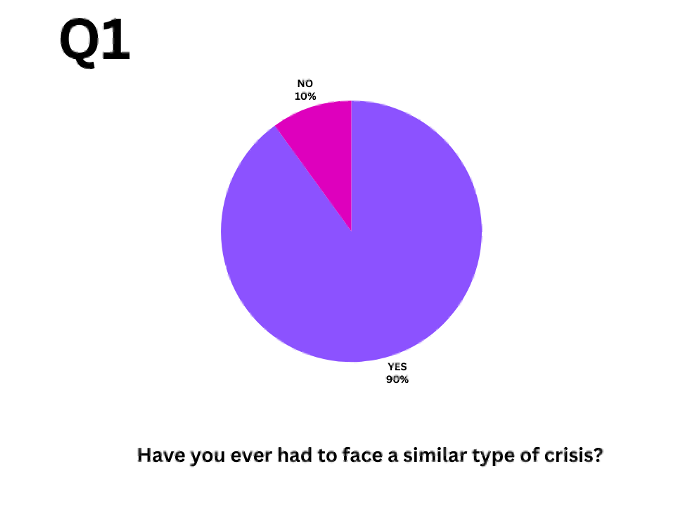
1. Figure 1: Pie chart referring to answers from Question 1
The first question asked, as seen above, referred to the management’s past experiences and whether they had faced a similar situation beforehand in their careers. As seen on the pie chart, most of the respondents answered positively to this question, as expected, due to the island’s frequent encounters with wildfire due to its climate.
Questions 2.1 & 2.2
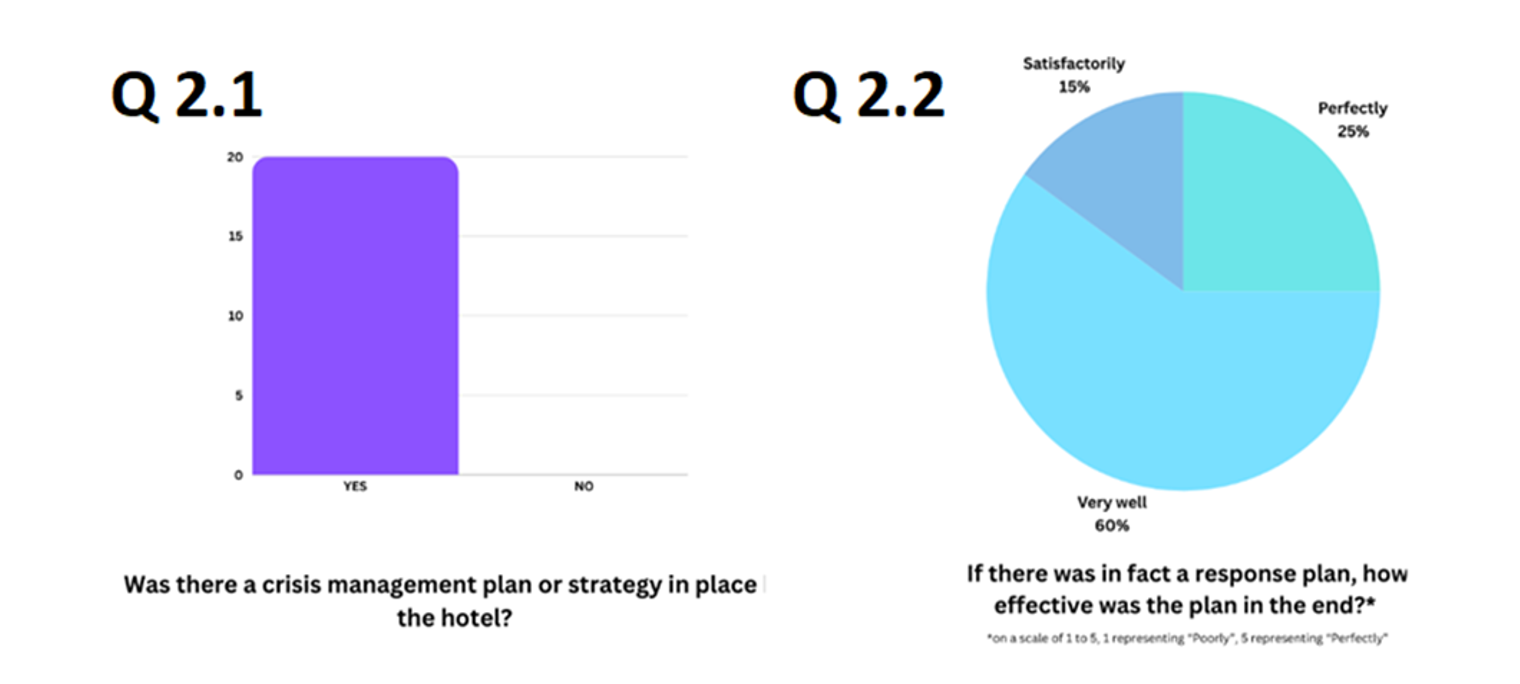
2. Figures 2.1 &2.2: Visualization of Questions 2 and 3 in charts.
The second question asked the management officials whether a crisis management plan or strategy was in place before the adverse conditions occurred. As dictated by Greek law, every response was positive, although only 25% of the respondents stated that the plan worked perfectly. A far larger percentage states that the plan worked very well and 15% of the managers said that the strategy followed worked satisfactorily well.
Question 3
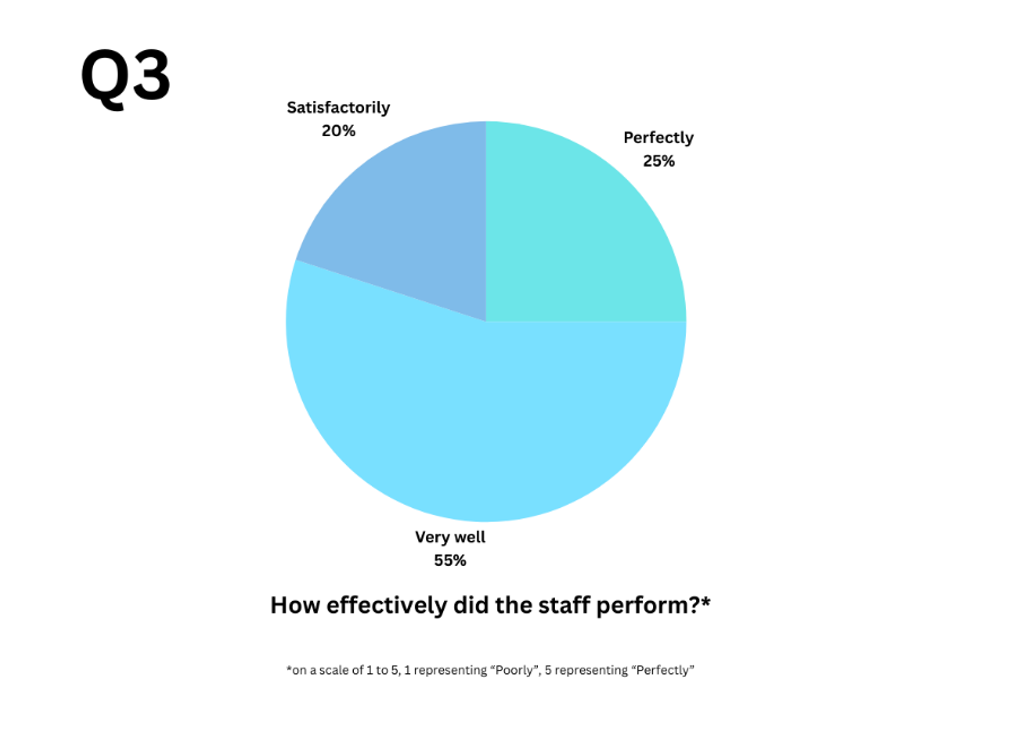
3. Figure 3: Pie chart referring to Question 3.
The third question required that the managers rated on a scale of 1 through 5 the effectiveness of their staff’s actions during the crisis. The number 1, as seen on the graph above, represents poor effectiveness while the number 5 represents complete effectiveness. The vast majority of the respondents stated that the staff performance was either perfect or very good, and one in five stated that it was just satisfactory.
Question 4
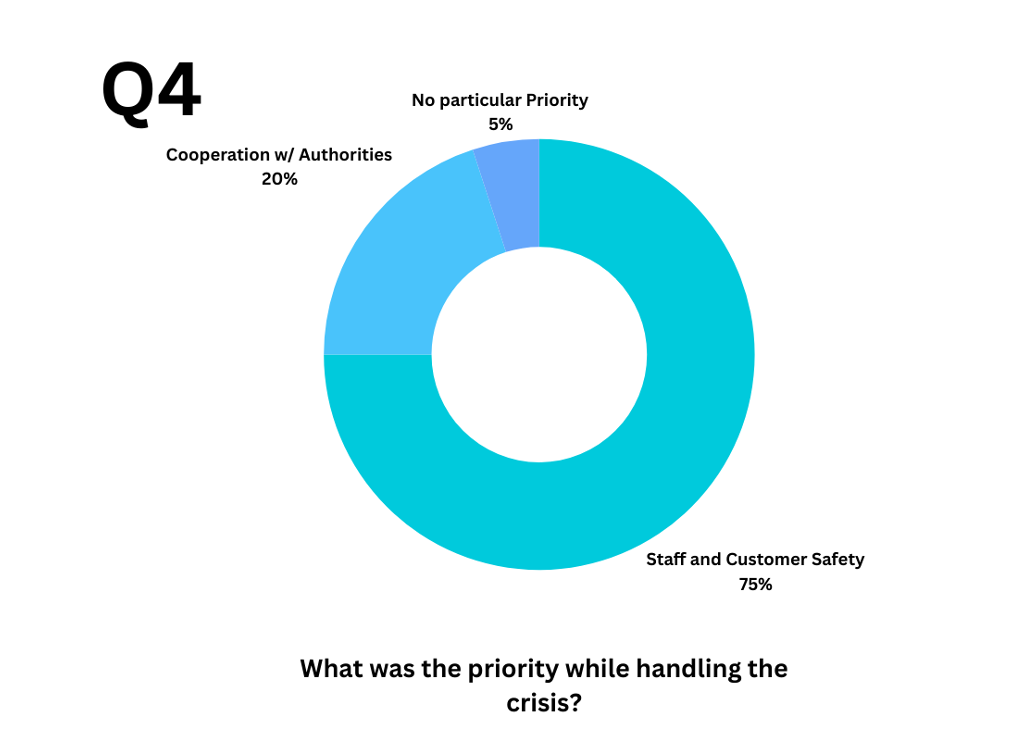
4. Figure 4: Graph describing management priorities during crisis.
As seen above, the fourth question is about the management’s priorities while the crisis was ongoing. Three out of four respondents stated that staff and customer safety where their main priority while the situation was taking place, and while another 20% said that they focused on cooperating and dealing with the problem with local authorities, 5% of the managers had not had a particular priority in mind while assessing the situation.
Questions 5 & 6
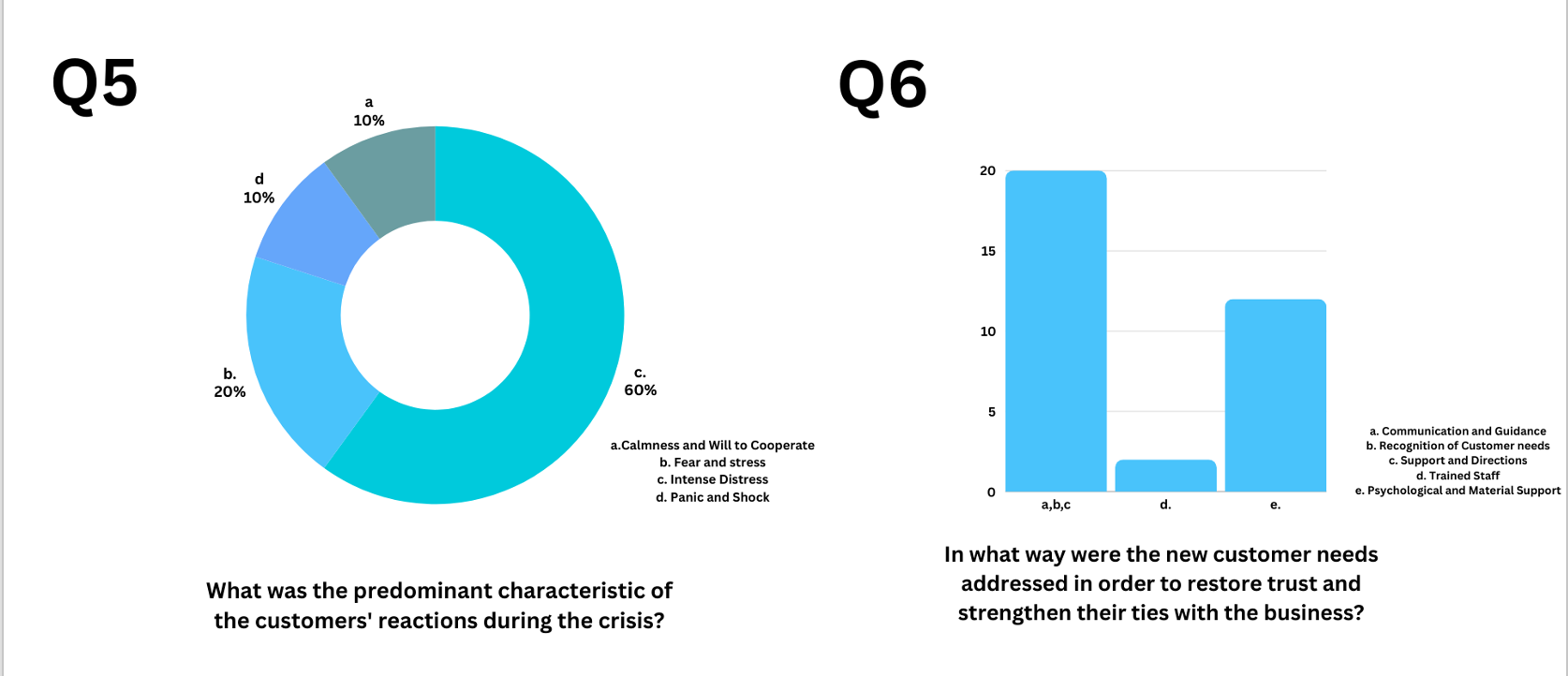
5. Figures 5&6: Customer psychology and needs visualization,
The following questions pertained to the customers’ psychological state as well as the way their needs that arose following the crisis’ start were addressed by the hotel. As expected, most of the customers were in a state of intense distress, while a smaller percentage expressed a series of more extreme emotions such as panic and shock. One in four customers expressed a certain level of calmness and composure as well as lower amounts of stress. Lastly, on the management’s side, a lot of attention is paid to restoring the ties and the trust between the establishment and the customers, as seen on the Q6 graph.
Question 7
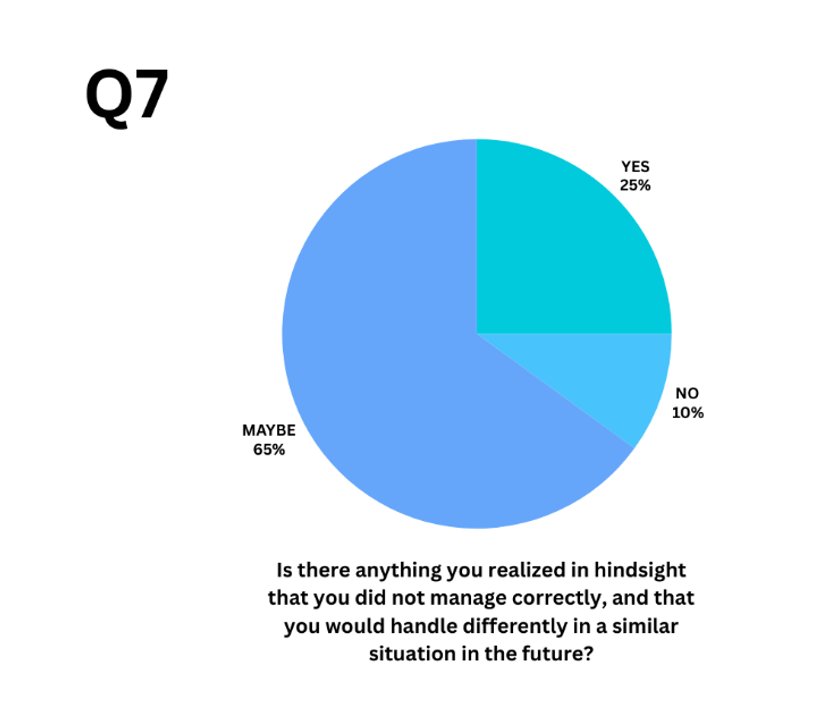
6. Figure 7: Management opinion on their reaction.
The question number seven refers to their insights on how they reacted to the crisis, whether their response was appropriate or could use some improvement. It’s important to note that more than half said that they would have probably faced it differently or better, while only 25% appeared satisfied with the way they reacted. A final 10% responded as not satisfied at all of their management of the situation.
Questions 8.1 & 8.2
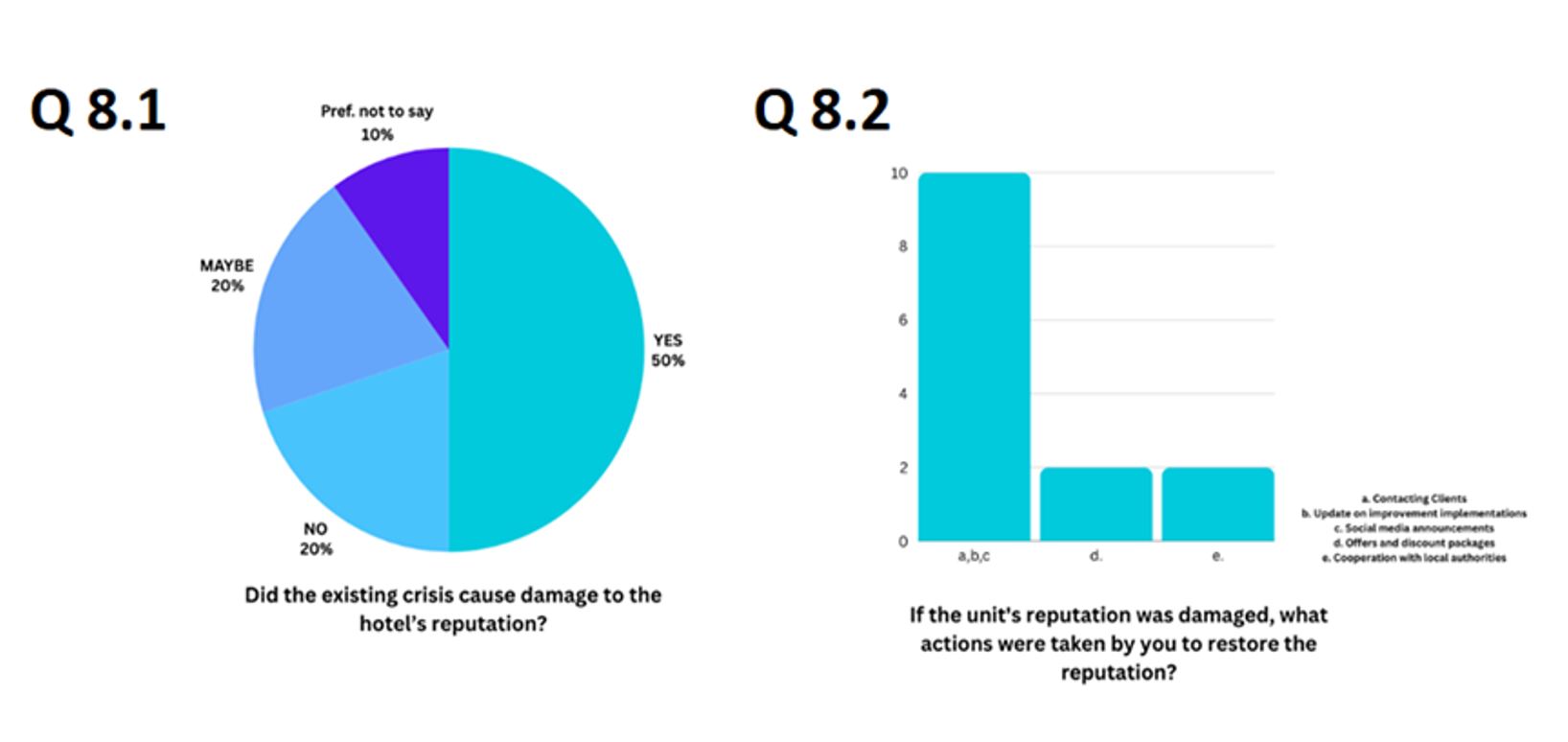
7. Figure 8.1 & 8.2: Graphs pertaining to the establishments' reputation after the crisis.
The following two questions referred to the effect of the crisis on the hotel’s reputation. Half of the population stated that their reputation took somewhat of a damage, 20% is unsure, while 10% chose not to answer. Only 20% of the managers theorized that the reputation remained intact. Out of those who responded positively, every one of them used the three of the same means of restoring the unit’s reputation in combination with some other ones, as seen in the above bar graph.
Question 9
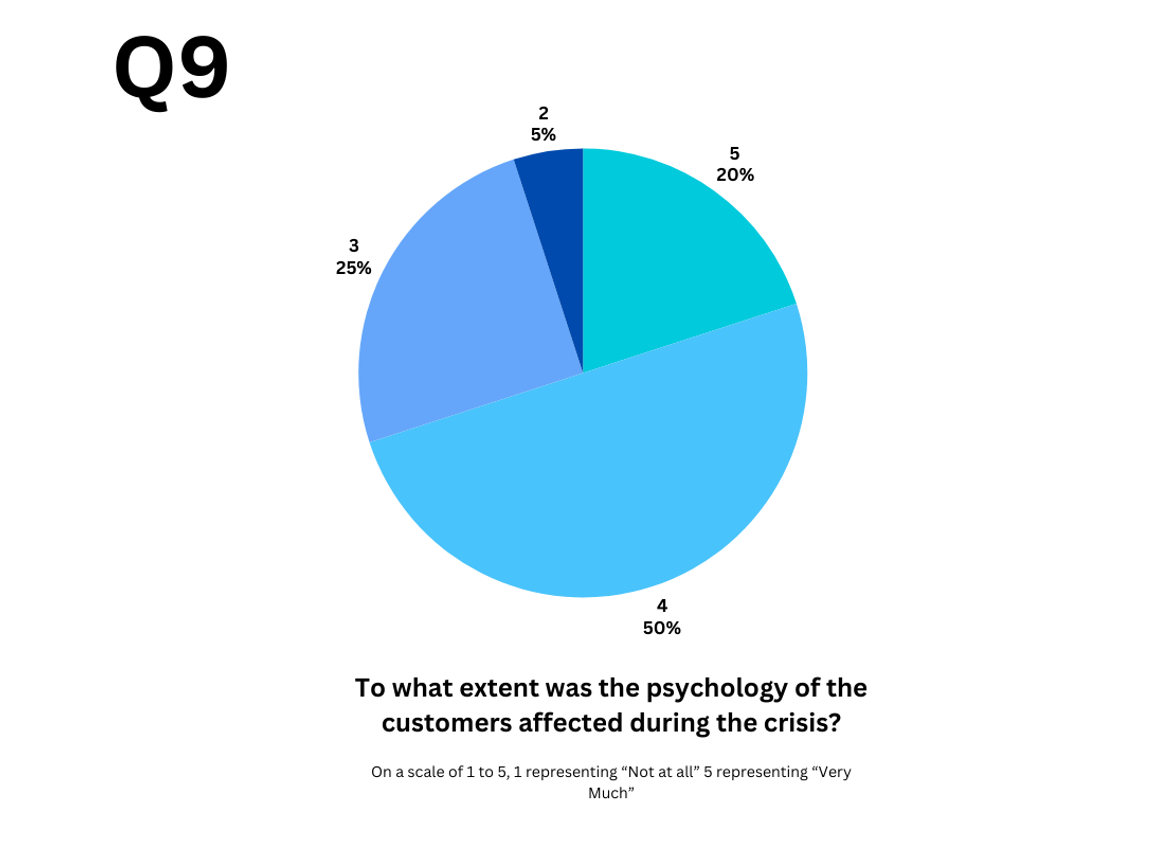
8. Figure 9: Effect on customer psychology while the crisis was ongoing.
9. The ninth question pertains to the effects the crisis had on the customers’ psychology. Half of the managers stated that the guests were significantly affected, a 4 on a scale of 1 to 5. A percentage of 20% of the managers stated that the effect on customers was of maximum scale, while the rest of the managers reported either a small or medium effect on their guests’ psychology.
Questions 10.1 & 10.2
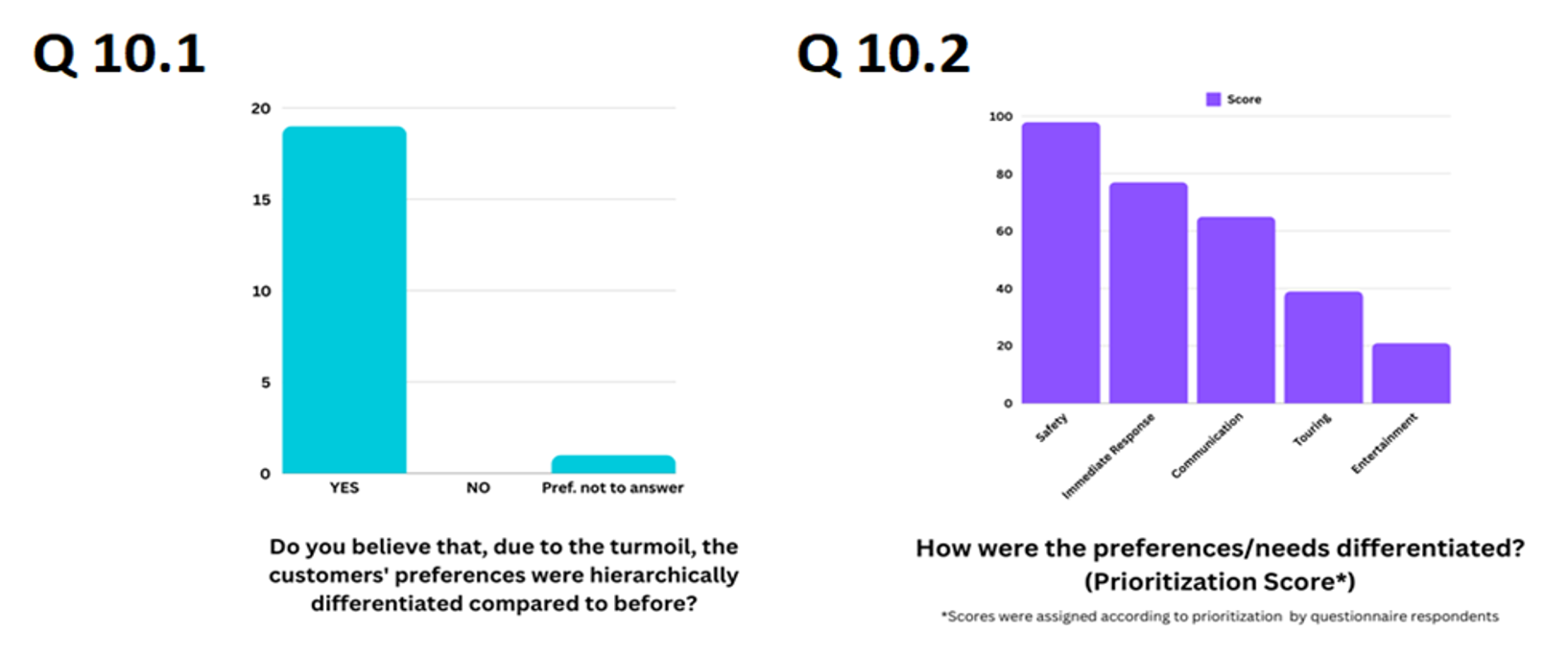
10. Figure 10.1 & 10.2: Diefferentiation and Hiearchy of customer preferences after the event.
The final two questions pertain to the customers’ needs after-the-fact. The tenth question asked whether the management believes that the customer needs were hierarchically differentiated after the end of the crisis, and the following question was about understanding how the priorities of guests shifted. Most of the managers stated that the needs had in fact shifted in priority after the situation concluded. Lastly, by requesting that they rank the new needs’ importance, the extraction of each need’s importance from highest to lowest became possible by assigning unique scores. The scores were assigned by giving a score of 5 to every need ranked as first and subsequently a score of 4 to any need ranked second etc.
Hypothesis Testing
The first hypothesis of the article is that adverse conditions have a significant impact on customer needs and psychology, while the second hypothesis talks about the remaining effects of the crisis on guest needs after situation concludes. Firstly, in the Q5 graph we can see the initial reactions of customers, of which only a slight percentage manages to maintain their composure and calmness, while 90% of the managers stated that their guests had a certain level of distress. The highest percentage of reports mentions a high level of distress. Moving forward to the results yielded by the ninth question, as seen on graph Q9, only 5% of the respondents referred to the effect in their customers’ psychology as slight, while 95% mention a significant level of psychological distress. Finally, according to the graphs Q10. & Q10.1, it’s stated that, even after the end of the crisis, the prioritization of the guests’ needs remained affected. Hierarchically, in contrast to expected prioritized needs in an out-of-crisis state, safety, immediate responses and communication were the top three needs, while entertainment and touring came last. The two initial hypotheses, according to the analysis, prove to be correct.
The third hypothesis refers to the fact that although the phenomenon seems to occur frequently, the management believes that there’s still room for improvement in dealing with it. Firstly, as proven by the first graph, 90% of the managers stated that they have dealt with this type of crisis before in their careers. Subsequently, as dictated by the law, every respondent confirmed the existence of a plan to deal with the situation, although only 25% of them considered that the plans worked perfectly, while 75% of them stated that the plan had worked either very well or just satisfactorily. On the same note, 25% said that their staff responded perfectly, while 75% stated a very good or satisfactory staff response. Finally, as seen on the graph Q7, 25% of the managers didn’t deem their reaction to the situation perfect, 65% stated that there’s a chance that they would have handled some things differently, while only a slight 10% was satisfied with the plan and their execution. As proven by the data, the hypothesis that even though this type of event seems to recur frequently, the management have not been able to master their reaction and their handling of it, and there’s still room for further improvement.
The fourth and final hypothesis is that crises taking place outside of hotel grounds have significant effects on the hotel’s reputation. As seen on the graphs Q8 & Q8.1, most managers responded positively, while some either did not respond or were not certain. Only 20% of the respondents responded negatively and recognized no harm to the hotel’s reputation. Of those that responded positively, 100% stated that they acted towards restoring the establishment’s reputation, mostly by contacting their clientele, updating their safety-improvement implementations and finally by offering offers and discounts to regain their old customers and approach new ones. As described above, the fourth hypothesis also proves to be correct by the analysis.
4. Conclusions
4.1 Discussion
Hospitality businesses face serious challenges in the form of adverse conditions, which have dramatic impacts on customer behaviour and expectations. For effectively addressing these difficulties, particularly within the context of Greek hotel units, a comprehensive understanding of the accompanying dynamics and proactive management is essential. A critical factor in ensuring the continuity of business operations and maintaining customer satisfaction is the ability to navigate successfully through challenging conditions.
Hotel management is capable of effectively addressing the problems posed by adverse conditions and emerging stronger as a result of these circumstances, provided they adopt customer-centric principles and execute proactive management techniques. This essay highlights the vital importance of resilience, adaptability, and customer-centric mindset in mitigating the negative consequences that such situations have on the hospitality industry.
Hotel managements can strengthen their relationships with their customers and position themselves for long-term success by prioritizing the health and happiness of their guests. In conclusion, this article underscores the critical role that strategic management plays in navigating the complexities of adverse conditions in the hotel industry. Furthermore, it demonstrates the transformative potential of resilience, adaptability, and customer-centricity.
According to the findings of our research, the data we collected regarding the behaviour and needs of guests in the event of a forest fire in their accommodation area can be categorized as follows:
- Panic and Anxiety: Certain guests might undergo feelings of panic and anxiety, particularly if they perceive the situation as perilous or threatening.
- Worry and Concern: A considerable number of guests may experience worry and concern regarding their own safety and that of others.
- Need for Safety: Guests often exhibit a strong desire for safety, seeking assurance and guidance from hotel staff.
- Calmness and Understanding: Despite the tumultuous circumstances, certain guests may maintain a composed and understanding demeanor, acknowledging the situation, and cooperating with hotel management.
In conclusion, the psychological responses of hotel guests during a forest fire can vary, encompassing reactions that span from panic to tranquility, influenced by individual perceptions and past experiences.
As for the procedures on the part of hotels to address the specific situation and the actions to restore the damage and ensure the sustainability of the businesses, they can be summarized as follows:
- Implementing strict safety measures and protocols to provide guests with confidence in their safety.
- Engaging in transparent communication with guests regarding the situation, outlining the recovery steps taken and any safety enhancements implemented.
- Providing discounts or exclusive packages to entice visitors and motivate them to revisit.
- Initiating marketing campaigns that showcase the hotel's resilience and enhancements following the fire incident.
- Partnering with local authorities and community groups to aid in recovery efforts and restore trust in the region.
- Delivering outstanding customer service and tailored assistance to guests impacted by the fire, showcasing empathy and sensitivity to their worries.
One of our key findings was that despite such a significant and dangerous event for the island of Rhodes, we observed that tourist visitation to the island continued without causing substantial losses.
Tourist activity in Rhodes set a record for the second consecutive year. The same high levels were maintained, with a slight increase compared to the previous year, confirming initial estimates that 2023 would see over 2.5 million tourist arrivals. According to November's traffic data announced by Fraport Greece, the overall assessment of this year's tourist season was particularly positive, with an additional 77,000 tourists (https://www.newmoney.gr).
The tourism sector experienced a temporary setback due to the July fire. Prompt action from authorities led to significant outcomes, quickly changing the media's view of Rhodes. Tourists recognized the island as a secure destination, and signs of recovery were apparent within a fortnight of the incident.
The Association of Greek Tourism Enterprises, in collaboration with the Greek National Tourism Organization, contributed through Marketing Greece by taking initiatives to revive tourism activity and manage the crisis, following exploratory discussions with island stakeholders. (https://www.insider.gr).
4.2 Notes and recommendations for further research
Due to the fact that the sample size was rather limited, and the contacting of the local managers happened very shortly after the conclusion of the crisis, although the findings were acceptable and consistent with both the literature and the hypotheses stated by the authors, it is recommended that future research on the subject should be done on a far larger scale in both the number of establishments as well as customers taken into consideration.
Becker-Olsen, K. L., Cudmore, B. A., & Hill, R. P. 2006. The impact of perceived corporate social responsibility on consumer behavior. Journal of business research, 59(1), 46-53.
Cohen, J. B., Pham, M. T., & Andrade, E. B. 2018. The nature and role of affect in consumer behavior. In Handbook of consumer psychology (pp. 306-357). Routledge.
De Mooij, M. 2019. Consumer behavior and culture: Consequences for global marketing and advertising.
Foxall, G. R. 2018. Consumer behavior analysis and the marketing firm: bilateral contingency in the context of environmental concern. In Leadership and Cultural Change (pp. 97-122). Routledge.
Foxall, G. R., Oliveira-Castro, J. M., James, V. K., Yani-de-Soriano, M. M., & Sigurdsson, V. 2006. Consumer behavior analysis and social marketing: The case of environmental conservation. Behavior and social issues, 15, 101-125.
Glaesser, D. 2004. Crisis management in the tourism industry. Routledge.
Gardner, M. P. 1985. Mood states and consumer behavior: A critical review. Journal of Consumer research, 12(3), 281-300.
Han, H. 2021. Consumer behavior and environmental sustainability in tourism and hospitality: A review of theories, concepts, and latest research. Sustainable Consumer Behaviour and the Environment, 1-22.
Henderson, J. C. 2007. Managing tourism crises. Routledge.
Henderson, J. C. 2007b. Tourism crises: causes, consequences and management. Routledge.
Johnson, M. D., & Selnes, F. 2005. Diversifying your customer portfolio. MIT Sloan Management Review.
Machová, R., Ambrus, R., Zsigmond, T., & Bakó, F. 2022. The impact of green marketing on consumer behavior in the market of palm oil products. Sustainability, 14(3), 1364.
Manral, L., & Harrigan, K. R. 2018. Corporate advantage in customer-centric diversification. Journal of Strategic Marketing, 26(6), 498-519.
Manral, L. 2016. The customer-centric logic of multi-product corporations. Journal of Strategy and Management, 9(1), 74-92.
Pekkarinen, S., & Ulkuniemi, P. 2011. Modularity in Creating Value for Diversified Customer Needs in Business Services Markets
Pechlaner, H., Abfalter, D., Raich, F., & Dreyer, A. 2007. Crisis management and tourism organizations: a comparative study in the European Alps. In Crisis management in tourism (pp. 157-169). Wallingford UK: CABI..
Reim, W., Sjödin, D., & Parida, V. 2018. Mitigating adverse customer behaviour for product-service system provision: An agency theory perspective. Industrial Marketing Management, 74, 150-161.
Solomon, M., Russell-Bennett, R., & Previte, J. 2012. Consumer behaviour. Pearson Higher Education AU.
Tronvoll, B. 2011. Negative emotions and their effect on customer complaint behaviour. Journal of Service Management, 22(1), 111-134.
INSETE. (2022). Statistical Bulletin for August 2022: General Satisfaction Index (GRI) of hotels in the island regions of Greece by month for the year 2022. INSETE. Retrieved from: https://insete.gr/statistical-bulletin/?lang=en
INSETE. (2023). Statistical Bulletin for July 2023: Individual quality indicators for island Greece. INSETE. Retrieved from: https://insete.gr/statistical-bulletin/?lang=en
Insider. (2023), Rhodes: Increased tourist activity on the island of Rhodes in November Retrieved from: https://www.insider.gr/toyrismos/297849/rodos-ayximeni-i-toyristiki-kinisi-sto-nisi-tis-rodoy-kai-ton-noembrio
Lifo, (2021), The Rhodes experiment: The Dutch are looking for about 200 people for holidays on the island - The conditions. Retrieved from: https://www.lifo.gr/now/greece/peirama-tis-rodoy-oi-ollandoi-anazitoyn-peripoy-200-atoma-gia-diakopes-sto-nisi-oi-oroi?utm_source=chatgpt.com
Lifo. (2023), Fire in Rhodes: Challenging night with flare-ups - Village evacuation Retrieved from : https://www.lifo.gr/now/greece/fotia-sti-rodo-anexelegkta-ta-tessera-metopa-ekkenothikan-oikismoi
Mitsopoulos Ι, G. A. (2015). Mapping fire behaviour under changing climate in a mediterranean landscape in Greece.
https://www.uaeco.edu.gr/files/PDF/papers_int/67_Mitsopoulos_et_al_2015.pdf
